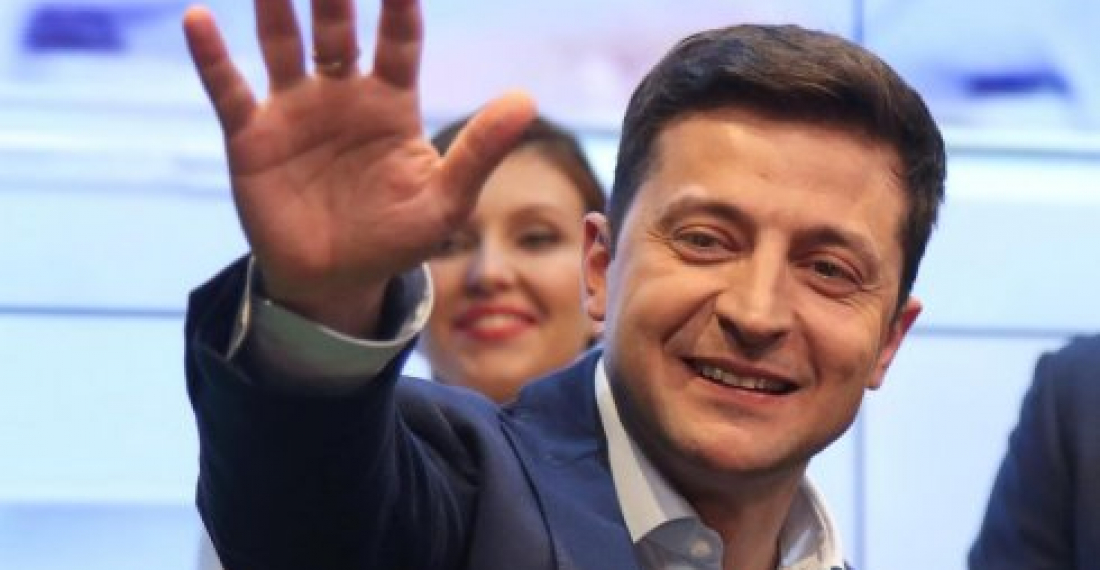The international community has over the last two days tried to articulate a response to the decision of the Ukrainian people to elect as president of the country with a landslide victory, someone whose greatest achievement so far was to be a good comedian. Volodymyr Zelensky's election on Sunday, was not a surprise, given that he had a significant lead during the first round of the polls. But the margin of victory, with Zelensky securing 73% of the votes cast was astonishing by any stretch of imagination.
With nearly all the votes counted Volodymyr Zelensky received 73.23% of the vote (13,524,027 voters), while his opponent, incumbent President Petro Poroshenko, was supported by 24.45% of the voters (4,516,354).
European leaders were quick to send congatulatory messages. Commission president Jean Claude Junker, and European Council president Donald Tusk took the opportunity to hammer in some key messages:
Allow us to express our appreciation for the strong attachment to democracy and the rule of law that the people of Ukraine have demonstrated throughout the electoral process. This is a major achievement in the complex political, economic and security environment, against the backdrop of continuous challenges to Ukraine's territorial integrity.
Significant progress has been made in the five years since Ukraine's Revolution of Dignity, and much remains to be accomplished to fully realise the peaceful, democratic and prosperous Ukraine that its citizens have called for.
As President of Ukraine, you can count on the EU's strong support to Ukraine's reform path, including consolidating the rule of law, fighting corruption, maintaining macro-financial stability and pursuing the essential reform of the energy sector. We strongly believe the further implementation by the EU and Ukraine of the Association Agreement, including the Deep and Comprehensive Free Trade Area, can be a crucial instrument in this respect. You can also count on the EU's continued and steadfast support of Ukraine's sovereignty, independence and territorial integrity.
We wish to extend to you our most sincere wishes for a successful term as President and look forward to meeting you at the earliest mutually agreed date.
In Moscow however, the Kremlin was in no rush. Russian Presidential Spokesman Dmitry Peskov explained on Monday that it was too early to congratulate Zelensky because he was to be "judged by specific actions," moreover, the official results of the elections haven't been announced yet, the Russian newspaper reported. The newspaper also carried comments from a number of Russian experts, some of them with good connections to the Kremlin.
The Ukrainian regime - regardless of the president's name - is rightly expected to be hostile to Russia, political scientist Yevgeny Minchenko pointed out. "This is why it is pointless to put trust in Zelensky in advance, while Prime Minister Dmitry Medvedev has made Russia's position clear," he added. On Monday morning, Medvedev said he could understand the Ukrainian people's choice but clarified that he did not expect Zelensky to change the country's rhetoric. According to media reports, Russia has plans to simplify the issuance of passports to the residents of the unrecognized Donetsk and Lugansk republics, Minchenko noted. The project is almost ready for implementation, a source close to the Kremlin told Vedemosti. "So I think [on the Kremlin's part] it's kind of an invitation to dialogue from a position of strength," the expert said.
Zelensky can benefit from the Kremlin's refusal to congratulate him, Minchenko added. "He was accused of being Putin's puppet, and now it turns out that Putin doesn't even want to congratulate him though he had congratulated and recognized Poroshenko," the expert emphasized. As for the West, Russia's reaction to the outcome of the Ukrainian election is of little importance, because the West controls the situation in Ukraine regardless of who is the country's president, Minchenko said.
"The military operation in eastern Ukraine is perhaps not the only reason behind the Kremlin's negative attitude towards Poroshenko: a more important reason is that in 2014, he managed to convince [Russia] he was a businessman with money being his top priority so it was possible to make agreements with him. However, things turned out differently: the 'Chocolate King' became commander-in-chief. Now they will watch Zelensky to see what becomes of him," said Vice President of the Center for Political Technologies Alexey Makarkin.
source: commonspace.eu






